Given that there are more books about Wyatt Earp and his world than there are about any other frontier gun-man, it can be difficult choosing which books to start with, which ones to add to your personal library, or even which ones to trust. I wont be tackling each of the many potential lines of inquiry in this post, but we’ll start with where to start with Wyatt Earp.
One of the reasons there are so many books on the life and travels of Wyatt Earp is because there was so much variation in his life with differing purposes. If you thought the first reason I was going to mention was because of all the disagreement among biographers, then you’re already familiar with the Earp field of study, I would have to assume. And though their is plenty of debate and bickering among researchers, it’s not something to wade into for this article.
Wyatt’s life could be broken up into several different eras, which is probably true of most lives worth a biography, but the fact that Wyatt lived so long opens up that many more avenues of study than the typical western gun-hand or lawman. With out getting too specific, we could say there was his youth traveling with his family and in California, his days on the frontier as a Buffalo Hunter, Bouncer, and Lawman, or his California based years as a speculator-capitalist, or his L.A. years as a prospector up until his death. And even in these brackets of time, there are still plenty more arteries to venture down.
This brings us to the subject of this post, and where to start with reading. There are two assumptions that I’ll make regarding this topic: one, that the average enthusiast is more interested in Wyatt’s time as a lawman, engaging in daring entanglements, and two, that looking online for books on Wyatt Earp boggles a persons mind and makes their eyes go crossed. Taking these into consideration, I offer forth what I consider to be the best starting point for someone who wants to study Wyatt Earp. (Please note that I am intentional in the use of the term study, and not meaning a casual one-book venture before moving on to a different topic all-together.)
There are four books that I would strongly suggest be the basis of a Wyatt Earp student’s book collection. I’ll list them in order, and explain the reasoning behind each.
Wyatt Earp: Frontier Marshal by Stuart Lake
People love to bash on this book and call it a fictional tale. The problem that I fear will happen is that new readers to the field will dismiss it thinking themselves one of the gullible masses for having indulged it. But you simply cannot study the life of Wyatt Earp without having first read Lake. There is a lot of discrediting of the book that goes on and some of that has been well founded and deserved, but with even further research, much of Lake’s account has been proven true, with primary thanks to the indefatigable efforts put in by author/researcher Lee Silva, who will be mentioned again later.
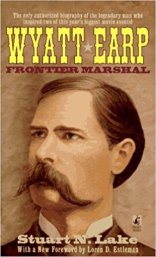 Lake’s book is certainly due its fact-checking, and there are some things he got wrong, but keep in mind that his primary source died early on in the development of the project. On top of that he was working in a time without internet, or easy phone calling and records like we have today. The very fact of how much the Lake Notes at the Huntington Library are referenced by today’s researchers shows how much value his work holds. The main fault against Lake is that he invented dialogue attributed to Wyatt, who was known widely for his laconic nature.
Lake’s book is certainly due its fact-checking, and there are some things he got wrong, but keep in mind that his primary source died early on in the development of the project. On top of that he was working in a time without internet, or easy phone calling and records like we have today. The very fact of how much the Lake Notes at the Huntington Library are referenced by today’s researchers shows how much value his work holds. The main fault against Lake is that he invented dialogue attributed to Wyatt, who was known widely for his laconic nature.
But because of, and in spite of, all this, Stuart Lake’s Frontier Marshal is a seminal work in the Earp arena. Essentially everything that comes after, whether in support or in contrast, is a branching out from the tale first told by Lake. It is also, if for no other reason, a very enjoyable read. What it lacks in footnotes and documentational support, it balances with an enjoyable tone and compelling wording. Make this the first book in your start to knowing Wyatt Earp.
Wyatt Earp: The Life Behind the Legend by Casey Tefertiller
Tefertiller’s book is probably the most prolific book of the new era of Earp research. Much of the book corrects the record on what Stuart Lake had gotten wrong, and with accurate well-researched information, he expounds on what was first recorded by Lake and others. When I had first read this book, I loved it and certainly learned tons, but it also made me realize that I had to read Lake before I really fully understood everything. So I read Frontier Marshal and then re-read Life Behind the Legend.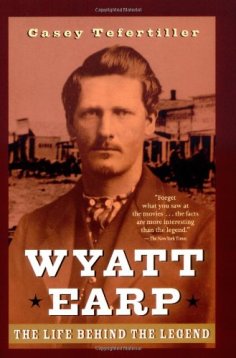
Tefertiller has proven himself to be level, fair, and understanding of the world he reports on. There is no agenda with his book, aside from straightening out the record where it’s warranted. He takes you through the early years and up to the end. The bulk of the book is very Tombstone heavy, however, and so what came before the Tombstone days, and after it, is not as in depth as Lee Silva, but is a very good book for getting a full story picture of Wyatt Earp, substantiated by all the footnotes and sources a person could hope for. After reading Lake and Tefertiller, a person should have a pretty good understanding of Wyatt Earp and his life. So let’s move on to the third book you need.
Wyatt Earp: A Biography of the Legend by Lee Silva
If you want to be an expert on Wyatt Earp you have to read this book. That is not hyperbole. The only other option is to do the same research that Lee Silva did on your own time; the smart enthusiast is going to go the route of reading what’s already published. What Lee Silva offers is an incredibly in depth look at every little facet of Wyatt Earps life, and the assorted claims and accomplishments. By doing so, he not only gives an amazing understanding of his life, but along the way offers a vindication of sorts for Stuart Lake. Silva breaks down any argument he can and often shows where Lake was coming from, and proves almost absolutely, that even when Stuart Lake was wrong, he wasn’t intentionally so; that everything he wrote he believed in, and had the notes and research to back it up.
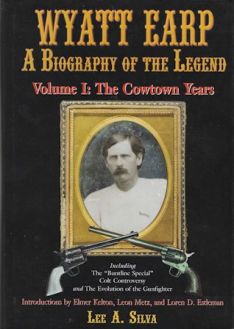 This knowledge of Stuart Lake is helpful in the study of Wyatt Earp, but what of the lawman himself? Well, Lee Silva does an amazing job here, too. He deftly shows, time after time, that the claims Wyatt made, often interpreted as bluster by the detractors, were true if just researched deeply enough. Take for example Wyatt’s claim about being one of the men who answered the call to a Camp Cadiz when he was a late teen in Southern California. The anti-earpers have used this as an example of Wyatt making stuff up to inflate his importance, but Silva, through his mastery in research, points out that there was a Camp Cady, often referred to as Cady’s. Then with additional details, shows that Wyatt was much more likely than not telling the truth.
This knowledge of Stuart Lake is helpful in the study of Wyatt Earp, but what of the lawman himself? Well, Lee Silva does an amazing job here, too. He deftly shows, time after time, that the claims Wyatt made, often interpreted as bluster by the detractors, were true if just researched deeply enough. Take for example Wyatt’s claim about being one of the men who answered the call to a Camp Cadiz when he was a late teen in Southern California. The anti-earpers have used this as an example of Wyatt making stuff up to inflate his importance, but Silva, through his mastery in research, points out that there was a Camp Cady, often referred to as Cady’s. Then with additional details, shows that Wyatt was much more likely than not telling the truth.
This is just the tip of the iceberg. Author Silva then goes through question after question looking for all the info that can be had and makes the case for each conclusion. It is, simply, the most in-depth look at Wyatt’s life and his statements about himself. This overwhelming amount of detail and consideration is why the first volume only covers up to his departure from Dodge headed for Tombstone. And even then the book is almost a thousand pages. This is both a blessing and a curse. It is an invaluable item to have, but it’s also big and hard to come by. Online the average low price you can find it for is about two-hundred and fifty dollars. Take heart though, I found my copy for one-hundred on Abe books. So if you keep an eye out, you might find a more affordable copy. But either way, you need this book; I can’t stress it enough. It was the most fun I’ve had reading any biography or western book.
Wyatt Earp’s Cow-Boy Campaign by Chuck Hornung
Hornung’s book is the most detailed account of what happened following the murder of Morgan Earp. He offers some context, giving a look at all the key players in the Tombstone drama, and then follows with a day-by-day chronology of everything that happened in Tombstone leading up to the explosive finale. After this he makes the case showing how Wyatt operated in ridding the territory of outlaws and safely moving his team out of the country, and back again, all with the help of various authorities.
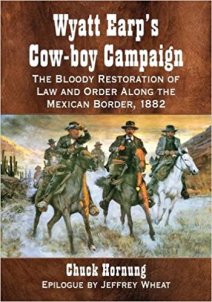 On this alone the book could probably be considered a must for Earp research, but what Hornung does by extension that is so important is that he doesn’t just lay out some interesting facts. Rather, that the culmination of these facts show Wyatt Earp to have been a lawman working in the scope of the law and working for the benefit of law and order. Some have considered him a lawless assassin seeking revenge. The facts show that he was a strongly supported agent of the law, and this is very crucial to the legacy of Wyatt Earp, and should definitely be read when forming an idea of who Wyatt Earp was and what his life was about.
On this alone the book could probably be considered a must for Earp research, but what Hornung does by extension that is so important is that he doesn’t just lay out some interesting facts. Rather, that the culmination of these facts show Wyatt Earp to have been a lawman working in the scope of the law and working for the benefit of law and order. Some have considered him a lawless assassin seeking revenge. The facts show that he was a strongly supported agent of the law, and this is very crucial to the legacy of Wyatt Earp, and should definitely be read when forming an idea of who Wyatt Earp was and what his life was about.
So to sum up, these are the four books that need to be read, and realistically owned if possible, when starting your venture into Earpiana. I would suggest reading them in the order presented here. There are other great books that should also be read, but I will do follow up articles stating what I believe are the value of their contributions and where I think they should be placed in a persons buying order.
Recap:
- Stuart Lake’s Wyatt Earp Frontier Marshal (1931)
- Casey Tefertiller’s Wyatt Earp: the Life Behind the Legend (1997)
- Lee Silva’s Wyatt Earp: A Biography of the Legend vol. 1 The Cowtown Years (2002)
- Chuck Hornung’s Wyatt Earp’S Cow-boy Campaign (2016)



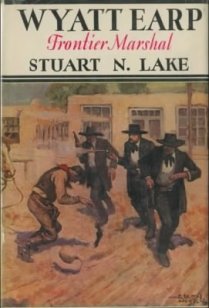 Another product of his excessively thorough research is that he presents a refreshed picture of Stuart Lake, proving that he was not the tall-tale-teller that so many have claimed he was. Silva extensively examines Lake’s notes and communications and often proves an indefatigable effort towards finding the truth. Perhaps Lake’s publishers had a hand in intentional mis-information, but when one fully considers all of Lake’s efforts it becomes clear that it is unfair to call the man a hack.
Another product of his excessively thorough research is that he presents a refreshed picture of Stuart Lake, proving that he was not the tall-tale-teller that so many have claimed he was. Silva extensively examines Lake’s notes and communications and often proves an indefatigable effort towards finding the truth. Perhaps Lake’s publishers had a hand in intentional mis-information, but when one fully considers all of Lake’s efforts it becomes clear that it is unfair to call the man a hack.
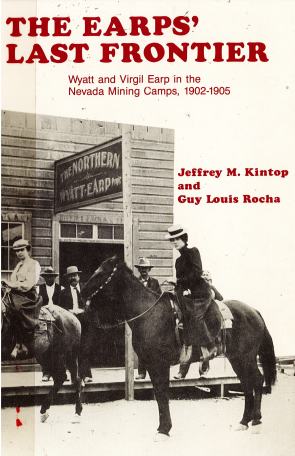 Earp’s Last Frontier is a great little book that covers time spent in Nevada by any of the Earp family, though focusing primarily on Wyatt, and secondarily on Virgil. Jeffrey Kintop and Guy Rocha do a great job of painting the Nevada picture without being overly blustery or trying to make a mountain out of a mole hill. For the casual fan who is rabidly eating up history books covering the gunfight in Tombstone may be underwhelmed, but for the in-depth enthusiast, this book really gives a good insight to the years after Alaska and before the California wind down.
Earp’s Last Frontier is a great little book that covers time spent in Nevada by any of the Earp family, though focusing primarily on Wyatt, and secondarily on Virgil. Jeffrey Kintop and Guy Rocha do a great job of painting the Nevada picture without being overly blustery or trying to make a mountain out of a mole hill. For the casual fan who is rabidly eating up history books covering the gunfight in Tombstone may be underwhelmed, but for the in-depth enthusiast, this book really gives a good insight to the years after Alaska and before the California wind down.